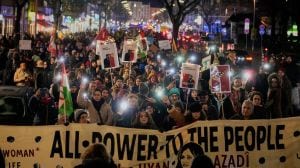Jagmohan disappoints telecom
NEW DELHI, March 22: Communications Minister Jagmohan, seems to have had his way, for the time being at least, with the final draft on th...

NEW DELHI, March 22: Communications Minister Jagmohan, seems to have had his way, for the time being at least, with the final draft on the new Telecom Policy 1999 not offering any concessions to existing players who were keen that their existing licence fee obligations be converted into a revenue sharing one.
The matter has, in the event, been referred to the Union Cabinet. Jagmohan has also managed to have his way on the issue of powers of the telecom regulator, the TRAI, and it has been decided that the TRAI will not act as the final court in any issues, such as licence fees, pertaining to the government which is the licensor. In case of a dispute between the government through the DoT and the private operator, the TRAI will merely act as an arbitrator. In disputes between operators including the DoT, however, the TRAI will be the adjudicatory authority. The NTP, however, has decided to split the role of the DoT into its role as a licensor and that as an operator the TRAI will be the decidingauthority in all matters pertaining to DoT8217;s operator role. The splitting of DoT8217;s role would be complete by 2001 while the process may begin much earlier.
One issue that Jagmohan had to back off on was that Department of Telecommunications DoT and MTNL would have to apply for a separate licence and also pay licence fees on par with private operators in either metros or circles where they want to provide cellular services.
The NTP 1999, it is learnt, would open the basic service operations to multipoly in circles which have not seen privatised telecom networks. For cellular circles, apart from two private companies, DoT/MTNL will be allowed as the third operator.
The GoT decided the broad framework for the rules governing future private investment in the telecom sector. It is understood that the date for opening up of domestic long distance STD to private companies has been set at January 1, 2000 with a detailed structure on the policy for this to be announced by August 15, 1999. The policy mayallow cellular mobile service providers, CMSP will be allowed to carry their own long distance traffic within their service area without applying for a separate licence for long distance. It also suggests that CMSPs be allowed to carry voice and non-voice messages and data services.
The CMSP licences would be for 20 years extendible by 10 years with no restriction on the number of licences one company wants to get. There would be a one time entry fee while the rest could be revenue sharing formula for future licensing in cellular services. The revenue share formula would be derived after consultation with the TRAI.
For Fixed Service Providers FSPs or basic service operators as they are currently called, the draft suggests that they would also be free to provide domestic long distance STD calls within their circle without applying for a fresh licence. Further, once long distance is opened to private companies by January 1, 2000, these companies will be allowed to interconnect to Videsh Sanchar NigamLtd VSNL. These licences will also be based on the 20 plus 10 year formula with a one time entry fee and a revenue sharing formula for the government.
Court spikes JT Mobiles plea
NEW DELHI: The Delhi High Court on Monday turned down JT Mobiles8217; appeal against encashment of its Rs 126.63 crore bank guarantee for the Karnataka circle by the Department of Telecommunications. A division bench of the high court refused to grant a stay to the company.
JT Mobiles had filed an appeal before the division bench after a single judge bench last week cleared the decks for DoT to encash the company8217;s bank guarantee, DoT sources said.
Meanwhile, Hughes Ispat has paid its outstandings of Rs 80 crore towards licence fee on Saturday. Essar Commvision has also paid Rs 26 crore. Essar paid Rs 25 crore through encashment of its bank guarantee plus another Rs 1 crore. A DoT official said that the high court decision in the JT Mobile case had once again vindicated communication minister Jagmohan8217;s stand thatprivate operators must pay 20 per cent of the licence fee irrespective of the proposed new telecom policy.
- 01
- 02
- 03
- 04
- 05






























